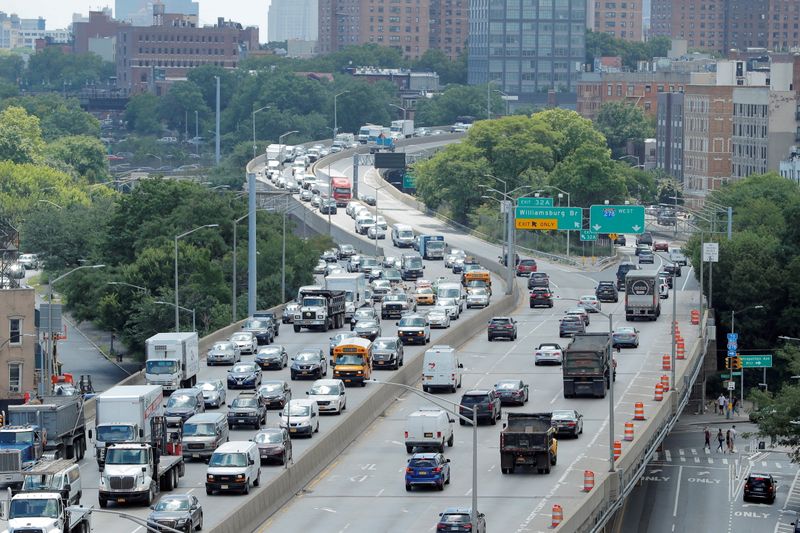By David Morgan
WASHINGTON (Reuters) -The Democratic-controlled U.S. House of Representatives approved a $715 billion surface transportation and water infrastructure bill on Thursday in what Democrats see as an early step toward sweeping infrastructure legislation that Congress hopes to complete in September.
The bill, which includes provisions from President Joe Biden's initial $2.3 trillion infrastructure proposal, authorizes additional spending for roads, bridges, highway safety, electric vehicle charging stations, rail, transit, drinking and wastewater infrastructure.
It also funds programs that would provide money for major projects, including an $11.6 billion plan to connect New Jersey and New York's Penn Station in midtown Manhattan via four modern transportation tubes beneath the Hudson (NYSE:HUD) River.
The 221-201 vote sends the legislation to the Democratic-led Senate.
The $715 billion "INVEST in America Act" contains more than $44 billion added during the amendment process to make greater investments in infrastructure, including electric vehicle charging and passenger rail grant programs, according to aides to House Transportation and Infrastructure Committee Chairman Pete DeFazio.
The action marks the first time that the House has voted to pass legislation containing earmarks, since Democrats and Republicans reinstituted the practice of allowing lawmakers to add pet projects to spending bills earlier this year.
The bill designates more than 1,470 projects amounting to nearly $5.7 billion in spending, according to the U.S. House Transportation & Infrastructure Committee. Nearly 1,070 projects worth just under $4 billion were sought by Democrats.
Republicans secured 403 projects valued at nearly $1.7 billion.
The legislation is necessary to reauthorize U.S. surface transportation programs by a Sept. 30 deadline.
House Democratic aides say the measure could also help a bipartisan working group in the U.S. Senate covert their $1.2 trillion infrastructure framework into legislative text. Biden has endorsed the bipartisan deal and the Democratic-led Senate hopes to pass legislation by the end of this month.
House Democrats are also working to produce a related landmark reconciliation bill that would address climate change, expand social programs and pay for new initiatives with tax hikes on U.S. corporations and the wealthy - objectives that Republicans reject.
House and Senate Democrats are aiming to pass a budget resolution with reconciliation instructions this month, and then give final congressional approval to bipartisan infrastructure legislation and the reconciliation bill in September. The initiatives could cost $6 trillion, all told.
Thursday's House surface transportation bill contains $343 billion for roads, bridges and safety - including $4 billion for electric vehicle charging infrastructure.

The measure also calls for $109 billion for transit and $95 billion for rail, including tripling funding for the U.S. passenger railroad, Amtrak, to $32 billion, $117 billion for drinking water infrastructure and more than $51 billion for wastewater infrastructure.
It would authorize $4.1 billion for grants to buy electric transit buses, create a $500 million grant program to reduce traffic gridlock in large metropolitan areas and $1 billion to address the shortage of parking for commercial motor vehicles and allow for heavier electric vehicles on U.S. roads and mandate additional safety features in new school buses.
